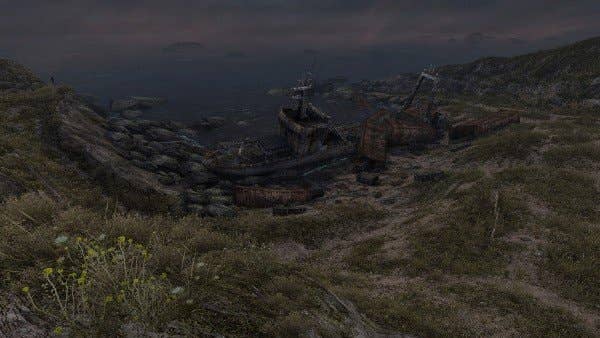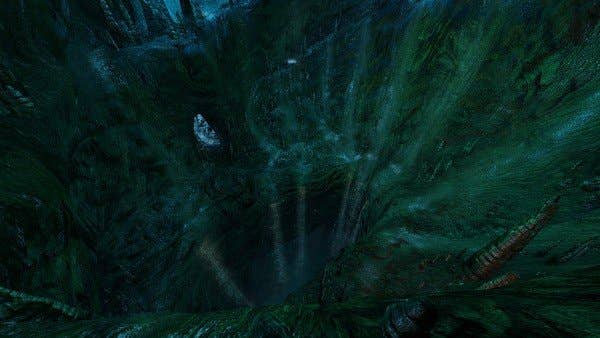Back To The Source: Dear Esther Reborn
Rob Briscoe explains how he wrung Dear Esther's potent aesthetics from the Source engine
It's a bit of a mix. The actual lighting itself, again, was born from technical limitations. I keep saying that, but I can't avoid it. In Source, you have a limitation where if you have normal maps on an object you can only have three lights on that one object. And each one of those rooms in the cave is actually one giant model, because another limitation is that Source doesn't do a lot of models very well. It has no instancing, so every time you put a model into the game, each one is getting drawn separately on each pass. So you can quickly use up a lot of performance. Without instancing you're basically piling on a load of CPU time.
They actually improved a lot on this with the newer engine, but by that time I'd built it all. So every area is just one giant model, and that forced me to think about how to light it in the most effective way with as few lights as possible. So generally in every scene you have just one very strong point light which directs you to where you want to go, and the colour projects the atmosphere and warmth of the room as well.
Another important part was filling in the gaps between the really bright areas and dark areas - I used a lot of reflections. They are a really important part of filling in the detail. I got the idea from watching a lot of film noir at the time. They do a lot of scenes through reflection of light, and silhouetting. It really helps to set the mood of the seen, and allows your eye to fill in details where there are none.
There's a lot of perceived detail in there - there's not actually lot of detail in the models - but it's the reflections and the normal maps and the silhouettes that makes your brain think there's a lot more detail in there, and hide repetition.

Valve introduced something with Left 4 Dead 2, which we got in the Portal 2 engine: a technology called a flow map that basically allows you to control where the water flows [by skewing and scrolling a normal map]. A lot of the stuff you see in the caves - the river, the big waterfall at the end - that was achieved entirely through using that new shader they have in the engine. It really adds a lot, especially for the ocean as well, where you've got this big flat open stretch of water.
One of the problems I had when we were still using the Orange Box version of Source, before moving on to the Portal 2 version, was trying to hide this really repetitively tiling normal map for the ocean. I tried to do that with the sea foam you see, the breaking waves, but it was still very apparent. But with the flow maps you can create this nice flowing surface that doesn't have any repetition at all.
That was one of the trickiest things to do actually. No matter what you do there's always going to be a slight transition between the real geometry and the skybox. A lot of that is covered up with fog and some very careful placement. It was a real pain in the arse to do, I have to admit. It's mostly in the texture work as well. I had to flatten out the waves when they came to the seam. There's a lot of trickery, like any game. We did it a lot in Mirror's Edge. You cover these things up with other bits of detail to fool the eye.
Technically, all I did was teleport the player to a different section of the world. I had this giant M5 built in a separate part, and flashed the player over then transported them back again. It's not as impressive as it might seem. But it was still a technical challenge to have this massive motorway area, which is actually built twice. There's two alternative scenes that you can experience there.
It's such a good time to be an indie developer. The market for it has opened up hugely, especially on PC. We became profitable in five hours
That's probably the most significant thing which can change in the environment. A lot of the other stuff is very small and integrated into the environment. In the lighthouse you might find a picture of a woman, or a map on the table, or a leaflet for a food convention - there's quite a lot of variation in the visual details. You might go through the game and not see any at all. You would then get a very auditory experience rather than a visual one.
It allows people to have their own interpretation of the story and to have their own experience. There are some things in there which go beyond the storytelling details - there are ghosts, figures that appear that give an interesting twist - whether that's supernatural or surreal.
Yes! I just wanted it to be a subtle suggestion, something unsettling that you see out the corner of your eye. And that's one of the things I've enjoyed reading about on forums. People saying, "I got really freaked out. I thought I saw something weird reflecting in the water in the last level. What the hell was that?"
And someone else will come along and say, "I didn't see any of that - what are you talking about?" And it creates a really nice discussion about the game. And that's true of the voiceover too, which, as in the original, is partly randomised.

No, no. We designed it intentionally to be ambiguous. There's no right or wrong interpretation - it's all about being able to bring a unique experience and interpretation to each playthrough. That was a big part of the remake.
I'm still deciding what I'm going to do. Dan's got a couple of really interesting projects on the go, but I haven't been able to get involved yet because I've been so tied up with Dear Esther. So I'm going to wait for the dust to settle and see what opportunities are available. I'd love to continue doing indie stuff, or even start my own small studio, but it's hard to tell at the moment.
The game's doing well, but whether that's enough, we'll have to wait and see. It's such a good time to be an indie developer. The market for it has opened up hugely, especially on PC. We were all surprised about how well it's done on PC. We became profitable in five hours!
Oh certainly, it's something we'd love to do. We have to talk to the right people about it first, but I think that'll be a hell of a lot easier now that we've established there's an audience for it.